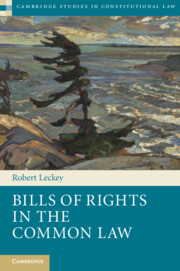Book contents
- Frontmatter
- Dedication
- Contents
- Acknowledgements
- Table of cases
- Introduction
- 1 Against bill-of-rights exceptionalism
- 2 The common law, judging, and three bills of rights
- 3 Judicial review of legislation before bills of rights
- 4 Bills of rights and other means of accessing judgment
- 5 Putting the strike-down in its place
- 6 Remedies from text to practice
- 7 Improving the system and engaging the legislature
- 8 Rethinking remedies and constitutional supremacy
- Conclusion
- Bibliography
- Index
1 - Against bill-of-rights exceptionalism
Published online by Cambridge University Press: 05 May 2015
- Frontmatter
- Dedication
- Contents
- Acknowledgements
- Table of cases
- Introduction
- 1 Against bill-of-rights exceptionalism
- 2 The common law, judging, and three bills of rights
- 3 Judicial review of legislation before bills of rights
- 4 Bills of rights and other means of accessing judgment
- 5 Putting the strike-down in its place
- 6 Remedies from text to practice
- 7 Improving the system and engaging the legislature
- 8 Rethinking remedies and constitutional supremacy
- Conclusion
- Bibliography
- Index
Summary
This chapter situates the book relative to literatures on bills of rights and serves as its methodology chapter. Because scholars who research comparative constitutionalism are often unselfconscious about method, as are legal scholars generally, including a methodology chapter makes a statement. Doing so signals a response to the observation that law professors and political scientists ‘rarely attempt to confront or engage with the methods and insights of the opposed discipline’. It reflects the conviction that leaving assumptions and choices undeclared stands to diminish scholarship's value. This chapter is integral to the four arguments that build across the book and explicates the underpinning methodological claim. Indeed, it is a manifesto of sorts, a plea for the importance of legal technique to constitutional and legal theory and a call for greater interaction amongst legal scholars and political scientists.
The first part of the chapter identifies the external orientation of much research on bills of rights as well as the tendency to isolate rights adjudication from ‘ordinary’ judicial activity. It calls this tendency bill-of-rights exceptionalism. The second part sets out this book's internal, legal approach, which conditions the way of reading judgments, the decision to address procedural and technical matters, and the selection of sources. It grounds that approach in three literatures. The third part explains the book's emphasis on continuity in judicial practice and introduces the analytic concept of judicial agency. The fourth part positions the book in relation to scholarship on comparative method, declaring scepticism towards presumptions of convergence and universalism, and outlining comparison's utility for this project. Finally, the fifth part specifies and justifies the scope of the book's comparative endeavour, explaining the selection of jurisdictions and the choices that shaped its data set.
An external approach and bill-of-rights exceptionalism
The legal, political, and social importance of bills of rights, combined with the controversy surrounding the powers they give judges, makes it crucial for scholars and policy makers to have theoretically and empirically grounded research about how those instruments interact with the legal system.
- Type
- Chapter
- Information
- Bills of Rights in the Common Law , pp. 7 - 33Publisher: Cambridge University PressPrint publication year: 2015



